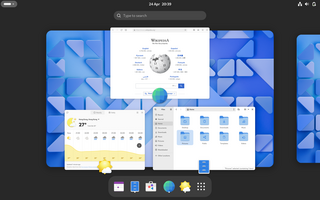
The GNU Lesser General Public License (LGPL) is a free-software license published by the Free Software Foundation (FSF). The license allows developers and companies to use and integrate a software component released under the LGPL into their own software without being required by the terms of a strong copyleft license to release the source code of their own components. However, any developer who modifies an LGPL-covered component is required to make their modified version available under the same LGPL license. For proprietary software, code under the LGPL is usually used in the form of a shared library, so that there is a clear separation between the proprietary and LGPL components. The LGPL is primarily used for software libraries, although it is also used by some stand-alone applications.

A Linux distribution is an operating system made from a software collection that includes the Linux kernel and often a package management system. Linux users usually obtain their operating system by downloading one of the Linux distributions, which are available for a wide variety of systems ranging from embedded devices and personal computers to powerful supercomputers.
Zope is a family of free and open-source web application servers written in Python, and their associated online community. Zope stands for "Z Object Publishing Environment", and was the first system using the now common object publishing methodology for the Web. Zope has been called a Python killer app, an application that helped put Python in the spotlight.

Advanced package tool, or APT, is a free-software user interface that works with core libraries to handle the installation and removal of software on Debian, and Debian-based Linux distributions. APT simplifies the process of managing software on Unix-like computer systems by automating the retrieval, configuration and installation of software packages, either from precompiled files or by compiling source code.

Scanner Access Now Easy (SANE) is an open-source application programming interface (API) that provides standardized access to any raster image scanner hardware. The SANE API is public domain. It is commonly used on Linux.

Ubuntu is a Linux distribution based on Debian and composed mostly of free and open-source software. Ubuntu is officially released in multiple editions: Desktop, Server, and Core for Internet of things devices and robots. The operating system is developed by the British company Canonical, and a community of other developers, under a meritocratic governance model. As of October 2023, the most-recent release is 23.10, and the current long-term support release is 22.04.
Windows Template Library (WTL) is a free software, object-oriented C++ template library for Win32 development. WTL was created by Microsoft employee Nenad Stefanovic for internal use and later released as an unsupported add-on to Visual Studio and the Win32 Framework SDK. It was developed primarily as a light-weight alternative to the Microsoft Foundation Classes and builds upon Microsoft's ATL, another lightweight API widely used to create COM and ActiveX libraries.
CherryPy is an object-oriented web application framework using the Python programming language. It is designed for rapid development of web applications by wrapping the HTTP protocol but stays at a low level and does not offer much more than what is defined in RFC 7231.

TurboGears is a Python web application framework consisting of several WSGI components such as WebOb, SQLAlchemy, Kajiki template language and Repoze.

A portable application, sometimes also called standalone, is a program designed to operate without changing other files or requiring other software to be installed. In this way, it can be easily added to, run, and removed from any compatible computer without setup or side-effects.

OpenGEU was a free computer operating system based upon the popular Ubuntu Linux distribution, which in turn is based on Debian. OpenGEU combined the strengths and ease of use of GNOME desktop environment with the lightweight, and graphical eye candy features of the Enlightenment window manager into a unique and user-friendly desktop. While OpenGEU was originally derived from Ubuntu, the design of the user gave it a significantly different appearance to the user, with original art themes, software and tools.

Wicd, which stands for Wireless Interface Connection Daemon, is an open-source software utility to manage both wireless and wired networks for Linux. The project started in late 2006 with the creation of Connection Manager, which eventually became Wicd. Wicd aims to provide a simple interface to connect to networks with a wide variety of settings.

The GNU General Public License is a series of widely used free software licenses or copyleft that guarantee end users the four freedoms to run, study, share, and modify the software. The license was the first copyleft for general use and was originally written by Richard Stallman, the founder of the Free Software Foundation (FSF), for the GNU Project. The license grants the recipients of a computer program the rights of the Free Software Definition. The licenses in the GPL series are all copyleft licenses, which means that any derivative work must be distributed under the same or equivalent license terms. It is more restrictive than the Lesser General Public License and even further distinct from the more widely used permissive software licenses BSD, MIT, and Apache.

GNOME, originally an acronym for GNU Network Object Model Environment, is a free and open-source desktop environment for Linux and other Unix-like operating systems.

Ubuntu Software Center, or simply Software Center, is a discontinued high-level graphical front end for the APT/dpkg package management system. It is free software written in Python, PyGTK/PyGObject based on GTK.

Plymouth is an application which provides a graphical boot experience for Linux. Plymouth supports animations using Direct Rendering Manager (DRM) and the KMS driver. Plymouth is bundled with an initial ramdisk which allows it to run before the file system is mounted. Some sources claim that Plymouth is named after Plymouth Rock, symbolizing the program's role as the first thing a user sees, but this has not been confirmed in any official capacity.

Listaller is a free computer software installation system aimed at making it simple to create a package that can be installed on all Linux distributions as well as providing tools and API to make software management on Linux more user-friendly.
Open Movie Editor is a free open-source non-linear video editing and post-processing program for Linux, and included in the Ubuntu and Debian repositories.

Armin Ronacher is an Austrian open source software programmer and the creator of the Flask web framework for Python.














